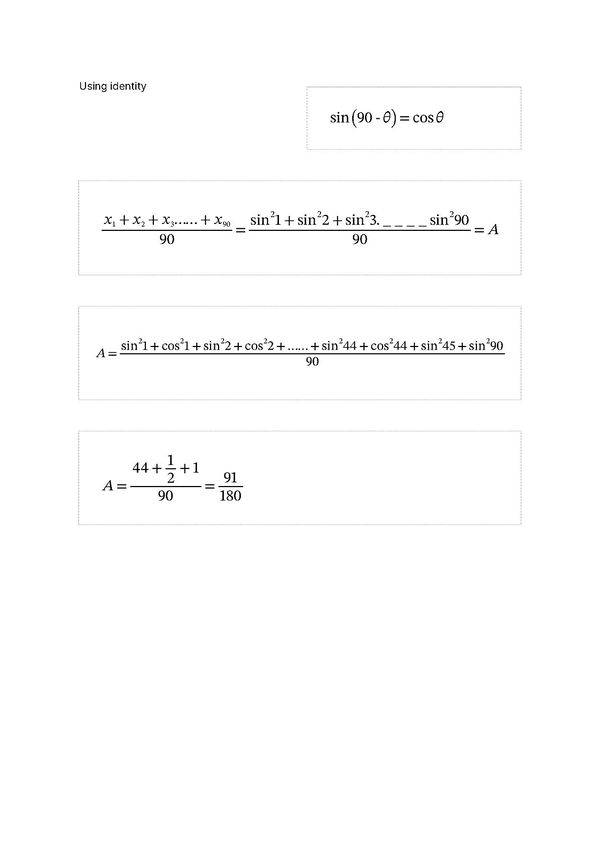Difference between revisions of "2024 AMC 12B Problems/Problem 11"
m (→Solution 1) |
m (→Solution 2) |
||
| Line 17: | Line 17: | ||
We can add a term <math>x_0</math> into the list, and the total sum of the terms won't be affected since <math>x_0=0</math>. Once <math>x_0</math> is added into the list, the average of the <math>91</math> terms is clearly <math>\frac{1}{2}</math>. Hence the total sum of the terms is <math>\frac{91}{2}</math>. To get the average of the original <math>90</math>, we merely divide by <math>90</math> to get <math>\frac{91}{180}</math>. Hence the mean is <math>\boxed{\textbf{(E) }\frac{91}{180}}</math> | We can add a term <math>x_0</math> into the list, and the total sum of the terms won't be affected since <math>x_0=0</math>. Once <math>x_0</math> is added into the list, the average of the <math>91</math> terms is clearly <math>\frac{1}{2}</math>. Hence the total sum of the terms is <math>\frac{91}{2}</math>. To get the average of the original <math>90</math>, we merely divide by <math>90</math> to get <math>\frac{91}{180}</math>. Hence the mean is <math>\boxed{\textbf{(E) }\frac{91}{180}}</math> | ||
| − | ~tsun26 | + | ~tsun26, ShortPeopleFartalot |
==Solution 3 (Inductive Reasoning)== | ==Solution 3 (Inductive Reasoning)== | ||
Revision as of 21:59, 25 December 2024
Contents
Problem
Let ![]() . What is the mean of
. What is the mean of ![]() ?
?
![]()
Solution 1
Add up ![]() with
with ![]() ,
, ![]() with
with ![]() , and
, and ![]() with
with ![]() . Notice
. Notice
![]() by the Pythagorean identity. Since we can pair up
by the Pythagorean identity. Since we can pair up ![]() with
with ![]() and keep going until
and keep going until ![]() with
with ![]() , we get
, we get
![\[x_1+x_2+\dots+x_{90}=44+x_{45}+x_{90}=44+\left(\frac{\sqrt{2}}{2}\right)^2+1^2=\frac{91}{2}\]](http://latex.artofproblemsolving.com/8/6/d/86d02b9f4fe65d5c9a788a85a28aea71f372c702.png) Hence the mean is
Hence the mean is ![]()
~kafuu_chino
Solution 2
We can add a term ![]() into the list, and the total sum of the terms won't be affected since
into the list, and the total sum of the terms won't be affected since ![]() . Once
. Once ![]() is added into the list, the average of the
is added into the list, the average of the ![]() terms is clearly
terms is clearly ![]() . Hence the total sum of the terms is
. Hence the total sum of the terms is ![]() . To get the average of the original
. To get the average of the original ![]() , we merely divide by
, we merely divide by ![]() to get
to get ![]() . Hence the mean is
. Hence the mean is ![]()
~tsun26, ShortPeopleFartalot
Solution 3 (Inductive Reasoning)
If we use radians to rewrite the question, we have: ![]() . Notice that
. Notice that ![]() have no specialty beyond any other integers, so we can use some inductive processes.
have no specialty beyond any other integers, so we can use some inductive processes.
If we change ![]() to
to ![]() :
: ![\[\frac{\sin^2\left(\frac{\pi}{4}\right)+\sin^2\left(\frac{2\pi}{4}\right)}{2}=\frac{\left(\frac{1}{\sqrt{2}}\right)^2+\left(1\right)^2}{2}=\frac{\frac{1}{2}+1}{2}=\frac{3}{4}\,.\]](http://latex.artofproblemsolving.com/1/8/8/1889ffab39fb8a79ac3fb5a862b724916f6d1a3d.png)
If we change ![]() to
to ![]() :
: ![\[\frac{\sin^2\left(\frac{\pi}{6}\right)+\sin^2\left(\frac{2\pi}{6}\right)+\sin^2\left(\frac{3\pi}{6}\right)}{3}=\frac{\left(\frac{1}{2}\right)^2+\left(\frac{\sqrt{3}}{2}\right)^2+\left(1\right)^2}{3}=\frac{\frac{1}{4}+\frac{3}{4}+1}{3}=\frac{2}{3}=\frac{4}{6}\,.\]](http://latex.artofproblemsolving.com/5/f/6/5f607bdeabf45870c0c46b705d4992d2da304604.png)
By intuition, although not rigorous at all, we can guess out the solution if we change ![]() into
into ![]() , we get
, we get ![]() . Thus, if we plug in
. Thus, if we plug in ![]() , we get
, we get ![]()
~Prof. Joker
Solution 4
~Kathan
Solution 4
Note that ![]() . We want to determine
. We want to determine  .
.

Graphing ![]() , we can pair
, we can pair ![]() and so on. We are left with
and so on. We are left with ![]() .
.
Our answer is ![]()
~vinyx
Video Solution 1 by SpreadTheMathLove
https://www.youtube.com/watch?v=gJq7DhLNnZ4&t=0s
See also
| 2024 AMC 12B (Problems • Answer Key • Resources) | |
| Preceded by Problem 10 |
Followed by Problem 12 |
| 1 • 2 • 3 • 4 • 5 • 6 • 7 • 8 • 9 • 10 • 11 • 12 • 13 • 14 • 15 • 16 • 17 • 18 • 19 • 20 • 21 • 22 • 23 • 24 • 25 | |
| All AMC 12 Problems and Solutions | |
The problems on this page are copyrighted by the Mathematical Association of America's American Mathematics Competitions. 










